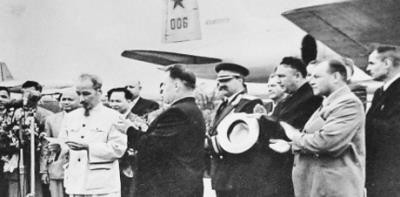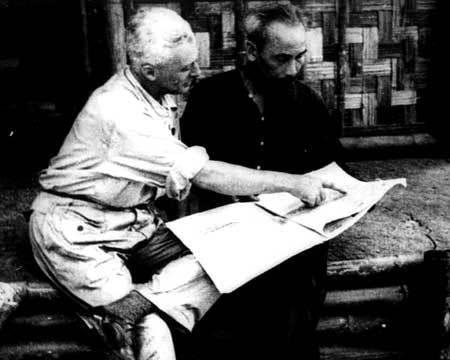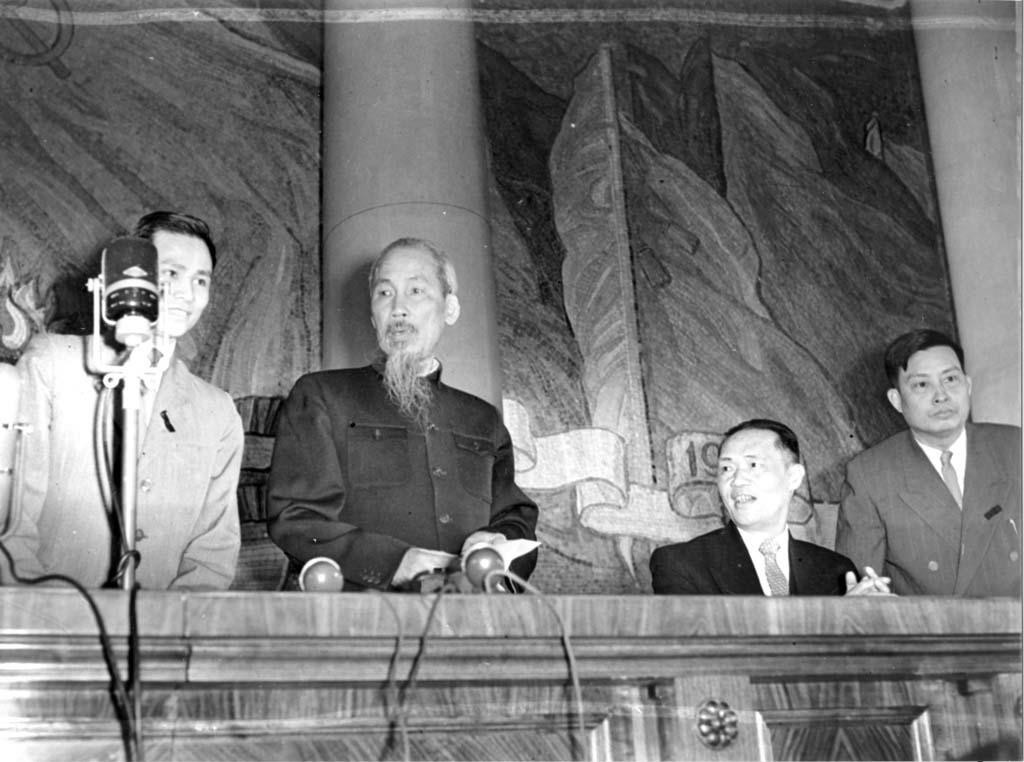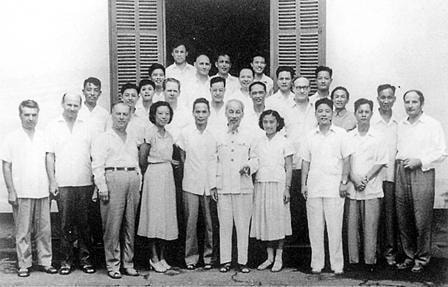Secret telegram when Uncle Ho passed away in memory of former Deputy Prime Minister Vu Khoan
"I will never forget the shock on the evening of September 2, 1969 when I held in my hand the secret telegram from the country reporting the bad news."
We respectfully introduce to readers the article of former Deputy Prime Minister Vu Khoan about the affection of the Soviet Union's leaders and people for Uncle Ho:
"Uncle Ho's passing leaves behind infinite sorrow not only in the hearts of our people but also in the hearts of millions of people around the world, including the people of the former Soviet Union.
I personally experienced that firsthand when I worked at our Embassy in Moscow and was assigned to be in charge of political relations, including relations between the two Parties.
 |
| President Ho Chi Minh officially visited the Soviet Union, July 1955. Photo archive |
I will never forget the shock on the evening of September 2, 1969, when I held in my hand a secret telegram from the country announcing the bad news: Uncle Ho had passed away! The telegram requested the Embassy to immediately notify the Central Committee of your Party and requested that you urgently send to Vietnam experts, tools, and materials necessary for the long-term preservation of Uncle Ho's body.
The thing is, in the late 60s of the last century, Uncle Ho's health was gradually declining, the Party Central Committee asked the Soviet Union to help preserve his body after his death. You sincerely responded to the request of our Party Central Committee and over the past 50 years have wholeheartedly cooperated with us in this sacred work.
It is understandable that at that time, this was a top secret. In the Embassy, only Ambassador Nguyen Tho Chan, the cipher officer and I knew. Unfortunately, at that time, the Ambassador was in Sweden, where he was also assigned. Therefore, I had to immediately go to the Foreign Affairs Department of the Central Committee of the Communist Party of the Soviet Union to inform him.
 |
| Uncle Ho with famous Soviet filmmaker Roman Karmen during the Dien Bien Phu Campaign in 1954. Photo archive |
When we met Mr. E. Glazunov, the Director of the Department in charge of relations with our Party, we both looked at each other with tears streaming down our faces, speechless because we both had the good fortune to directly meet and interpret for Uncle Ho many times. He promised to report to his superiors immediately, but I said that the content was too important and I was an official at too low a level so I didn’t know how to report. I had to inform him of my situation, and how to handle it was up to him to consider!
Not long after arriving at the Embassy, I received a phone call from Mr. Glazunov informing me that Mr. Iu. Andropov, Secretary of the Party Central Committee, Head of the Foreign Affairs Department (later, in the years 1982 - 1984, he was General Secretary of the Central Committee of the Communist Party of the Soviet Union) would come directly to the Embassy to discuss specific matters. This was an unprecedented event because such a high-ranking official had never personally come to a foreign diplomatic mission to handle such work!
Of course, I could not stand up to receive and work with him, so I decided to inform Mr. Nguyen Tien Thong, then Chargé d'Affaires, and Mr. Dang Quang Minh, Ambassador of the Republic of South Vietnam, to stand up to receive him because, after all, the fact that Uncle Ho had passed away was no longer confidential.
 |
| President Ho Chi Minh visited MGU on July 16, 1955. Photo: Archive |
Arriving at the Embassy almost in the middle of the night, Mr. Iu. Andropov, on behalf of the Central Committee, expressed his deepest condolences for the great loss of our people and Party and announced that the Party would use a special plane to immediately bring to Hanoi experts as well as necessary equipment, tools and materials.
Early the next morning, another unprecedented event occurred. The Soviet Union sent a team of experts and workers to our Embassy to redecorate the office according to funeral protocol.
And early in the morning, the entire leadership of the Soviet Party and State headed by General Secretary L. Brezhnev came to the Embassy to pay their respects to Uncle Ho. After the ceremony, you stayed for a long time, sharing unforgettable memories of the affection between Uncle Ho and your leaders and people.
Then, for several days in a row, countless Soviet people of all ages, classes, and regions lined up to visit Uncle Ho at the Embassy, among them were many foreign citizens working, studying, and visiting the Soviet Union.
The Soviet Union sent to Hanoi to attend Uncle Ho's funeral a rare high-level delegation led by Politburo member and Chairman of the Council of Ministers A.Kosyguine. A very important event took place here that perhaps not many people remember, expressing Uncle Ho's sincere wish stated in his Will to contribute to healing the discord between socialist countries, first of all between the Soviet Union and China, which had an immediate impact.
I still remember that in the middle of the night of September 8, 1969, the Soviet delegation requested to meet a high-ranking leader of ours to discuss an important matter. Our side sent comrade Le Thanh Nghi, member of the Politburo, Vice Chairman of the Council of Ministers to meet with their friend.
 |
| President Ho Chi Minh during a reception for Soviet experts working in Vietnam in 1960. Photo courtesy |
At the meeting that I attended as an interpreter, you suggested that we act as a bridge to arrange a contact with China at the head of government level. We immediately communicated that request to the Chinese side and the Chinese side accepted.
The meeting between Prime Minister A. Kossyguine and Prime Minister Zhou Enlai took place at Beijing airport, where the Soviet delegation turned off on their way back home. Although the relationship between the two largest socialist countries had not yet been mended, it had somehow eased after the military clash between the two countries at Damansky Islet (called Chenbao in China) on the Amur River (Heilongjiang) in 1969.
Half a century has passed, but in me the painful but also proud memories of the love and respect of the Soviet people and people around the world for Uncle Ho - the man who made our country glorious will never fade.

